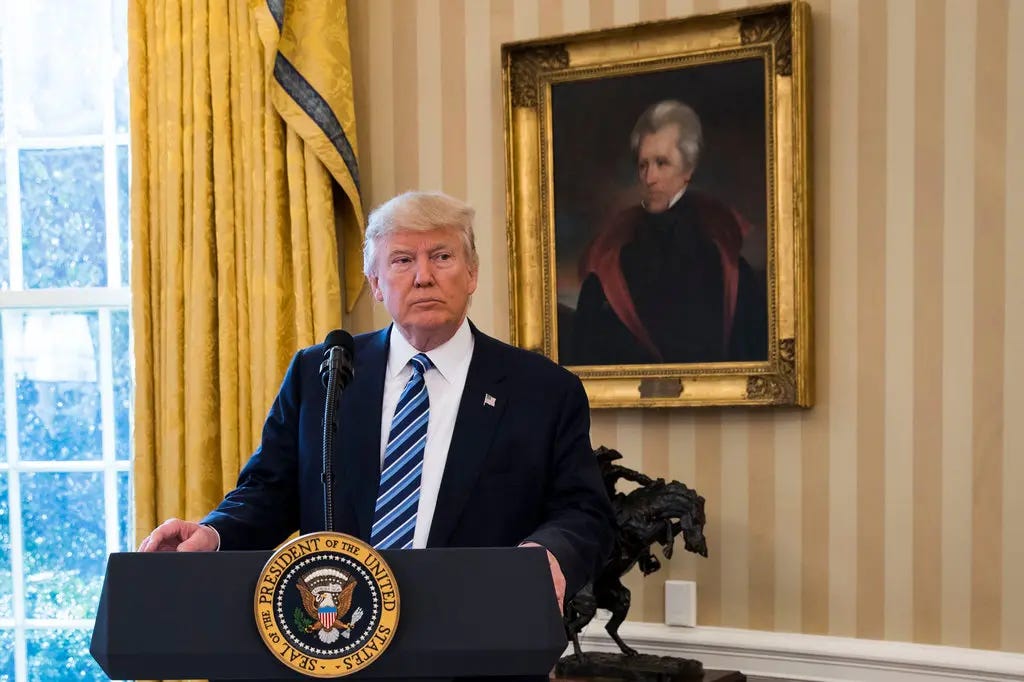Donald Trump has been compared with his fellow Scotsman Andrew Jackson any number of times in the last decade, often with good reason. (Trump, recognizing their affinity, has returned Jackson’s portrait to the place of honor it held in the Oval Office during his first administration.) Underlying many of their similarities is the way both were deeply polarizing figures in their times. It would be hard to overstate how threatening Jackson—enslaver, Indian killer, rejector of executive and Supreme Court authority—was to the generation of the Founders and their heirs (literally, in the case of John Quincy Adams, whom Jackson defeated in the presidential election of 1824). Nothing less than the survival of the republic was at stake, they said back then. Which is how people talk about Trump now. They may or may not be right this time.
The latest similarity between Jackson and Trump is the avowed embrace of both of what was known as the “spoils system” in politics. The notion of political loyalty as the most important criterion for appointment to a government position was not invented by Jackson when he installed his so-called Kitchen Cabinet upon coming into office in 1829. But the scale of his firings of existing employees and his avowed embrace of patronage politics was nevertheless shocking. Critics dubbed him “King Andrew,” pointedly mocking his populist man-of-the-people persona. But Jackson’s unapologetic approach to governance inaugurated the modern party system, one embraced by supporters and opponents for the rest of the nineteenth century. I’m always appalled, in reading accounts of Abraham Lincoln’s presidency, how much time the Great Emancipator devoted to postmaster jobs in small towns and the way he was inundated by office seekers who waited in line outside his office while he tried to run the Civil War.
Still, there were always people who believed that having the right friends, broadly construed, was not the best way of administering the government. That’s why Congress passed the Pendleton Act of 1883, which established the modern Civil Service. (Pendleton, a Southern sympathizer from Ohio and Democrat during the Civil War, is amusingly portrayed in Steven Spielberg’s 2012 film Lincoln.) Only a small number of positions initially fell into that category of jobs that required demonstrated ability, often in the form of exams. However, the number grew over time, gaining traction during the Progressive Era. By the end of the twentieth century, it was both common sense and practice that a wide swath of the federal bureaucracy was populated by non-partisan professionals whose primary loyalty was to Good Government itself.
Trump is in the process of changing that. For years, he and his allies have complained about the so-called Deep State, which they asserted is de facto leftist in orientation and insulated by labor protections that render it unresponsive to executive direction. Now he’s begun to do something about it with mass firings, offers of buyouts, and explicit acknowledgment of transactional considerations in staffing decisions. This is how Elon Musk was appointed to the newly-created Department of Government Efficiency, or DOGE. Appalling for anyone who thinks the government should not be run as a business, but logical in its way.
I’m not entirely unsympathetic to this effort. I do believe the federal bureaucracy has become encrusted with dysfunction over time. Many figures on the left, among them Ezra Klein in his forthcoming book, also believe there’s too much emphasis on process and not enough on outcomes. There can be real accountability in a transparent political approach: let the voters decide on who should be in charge; let that president take charge; and then hold a referendum on the resulting course of the country in the form of the next election. To paraphrase Langston Hughes, let democracy be democracy again.
Of course, it’s not that simple. There’s reason to believe that Trump’s policy will do real damage to the country. It’s very easy to imagine a defense secretary who’s drunk on the job, or an incompetent meteorologist miscalculating the direction or impact of a storm. There’s also reason to believe that any opponent who succeeds in succeeding Trump will continue such policies, much in the way that President Biden kept Trump’s tariffs against China in place when he took office. (And anyone who thinks that tariffs are a bad idea should grapple with the complexities of the current ones against Chinese electric cars, which could destroy the U.S. auto business.) But at this point, the best resistance to Trump is allowing him to own the consequences of his actions and to hold him accountable through democratic, as opposed to technocratic or legalistic means. Proposing laws rather than filing lawsuits.
Andrew Jackson, who wrecked the American economy by precipitating the Panic of 1837 with misguided banking policies, ended up on the $20 bill. (I should point out that Jackson also did some good things, among them staring down Southern secession and creating a more genuinely participatory political culture that would widen over time.) Perhaps Trump’s legacy should be more inflationary: the million-dollar bill. If we ever actually need currency that large it will provide a good basis on which to curse him.



